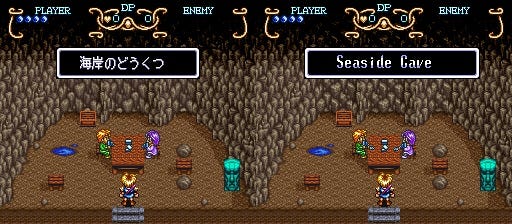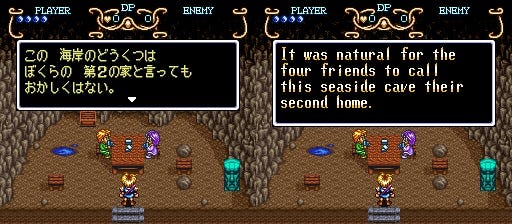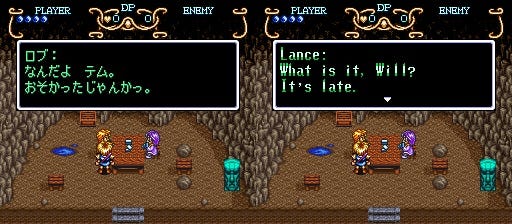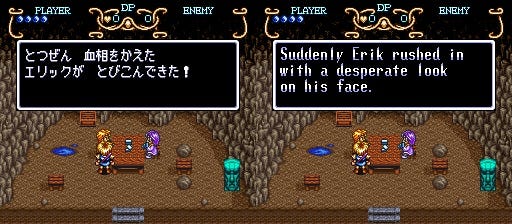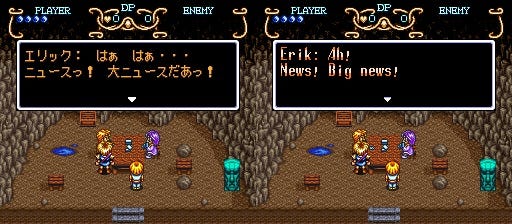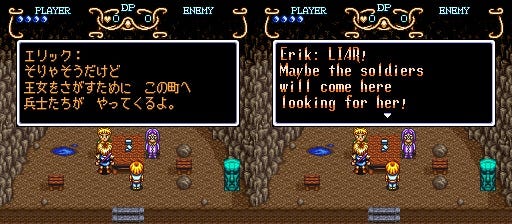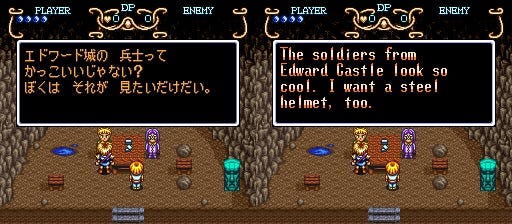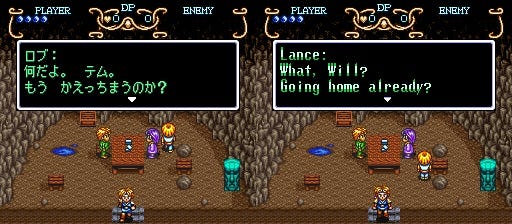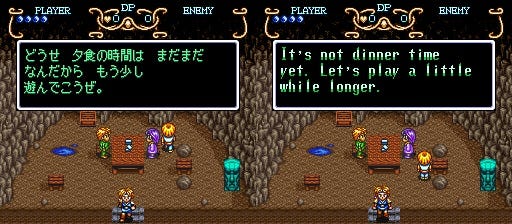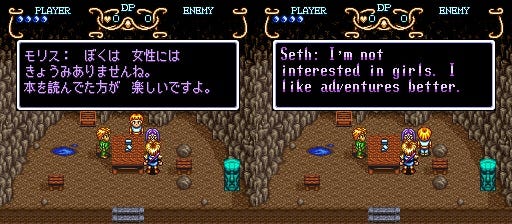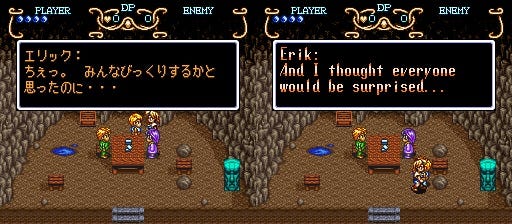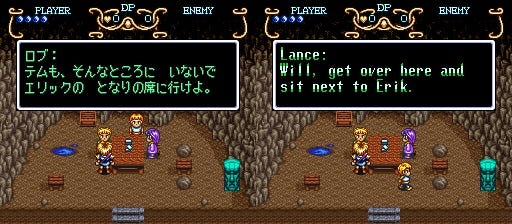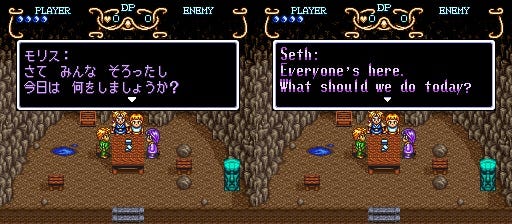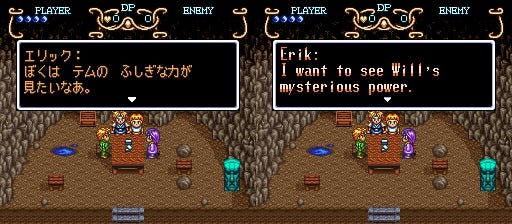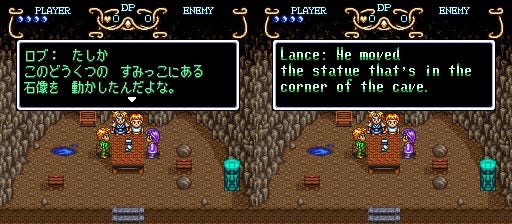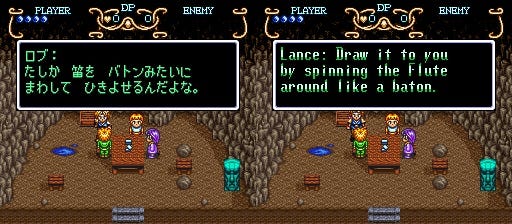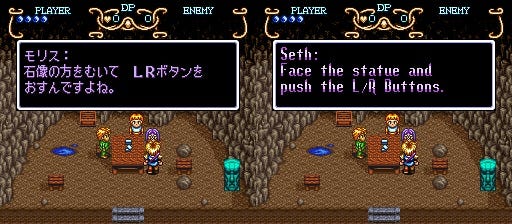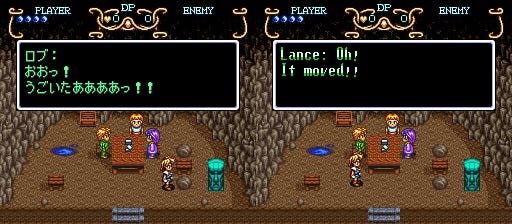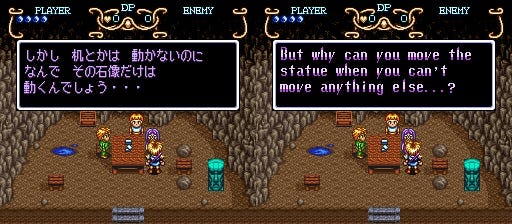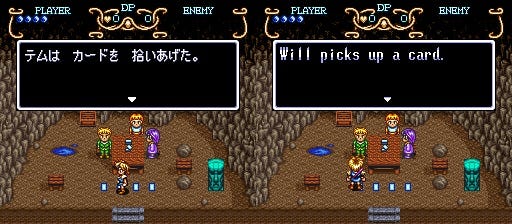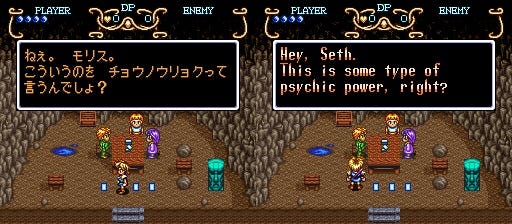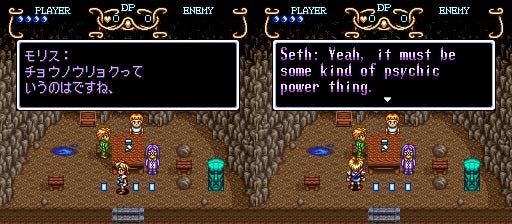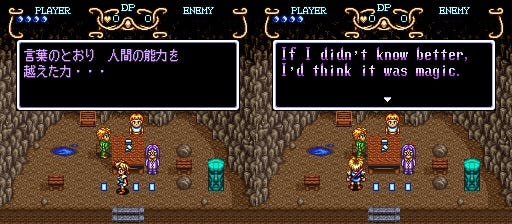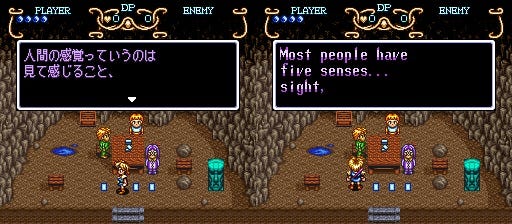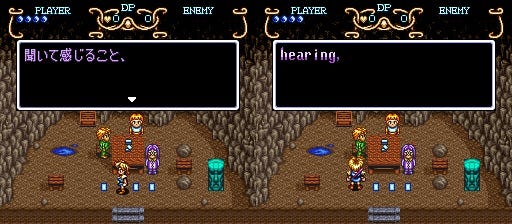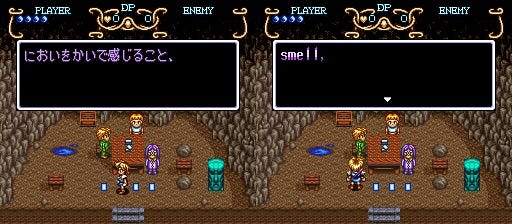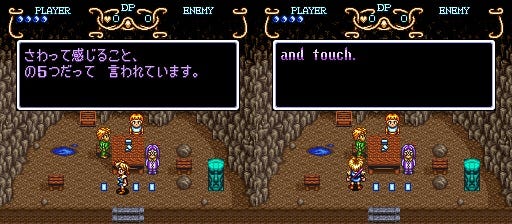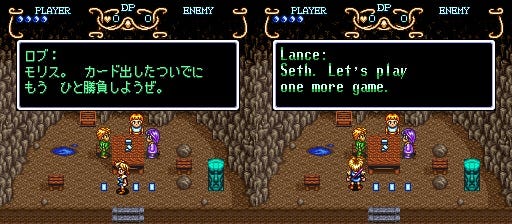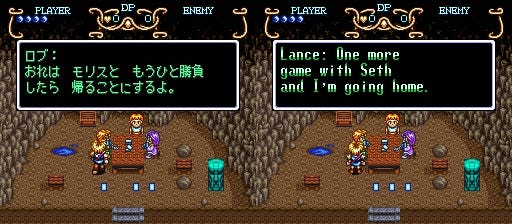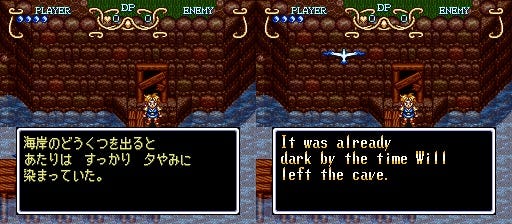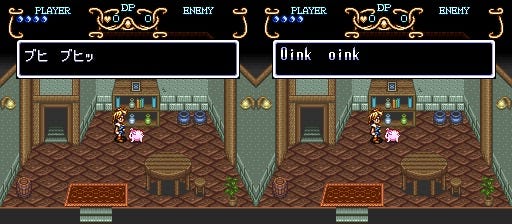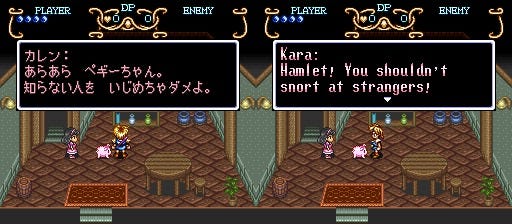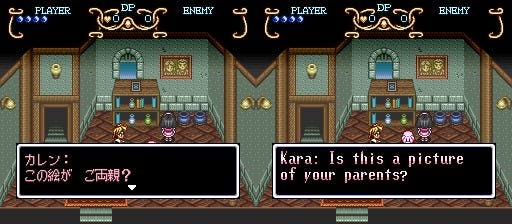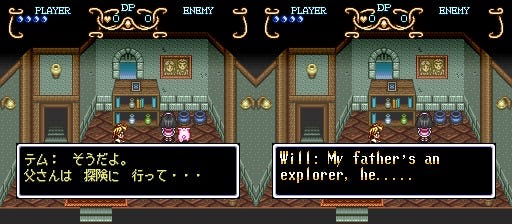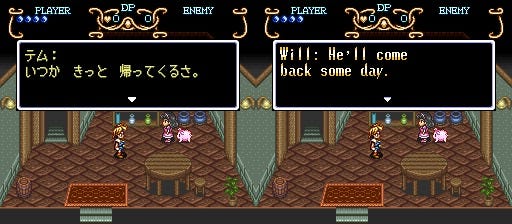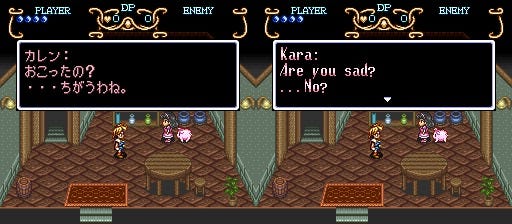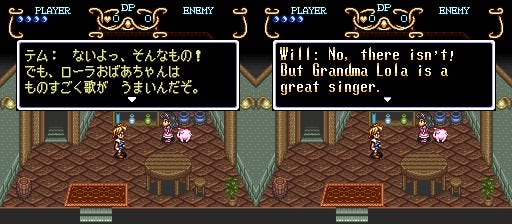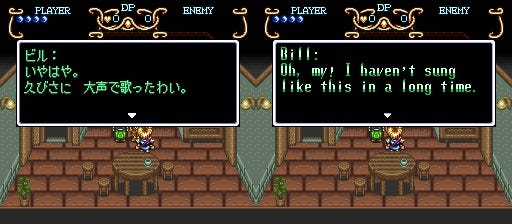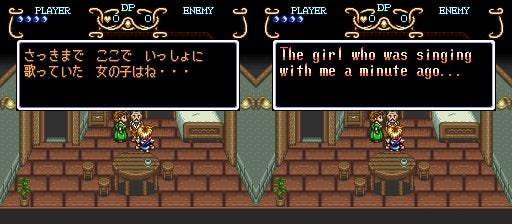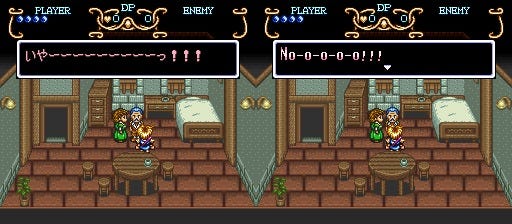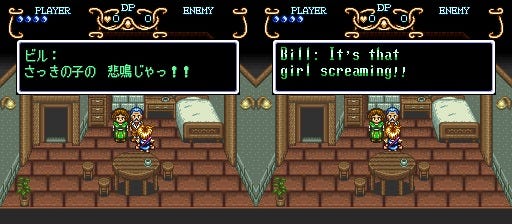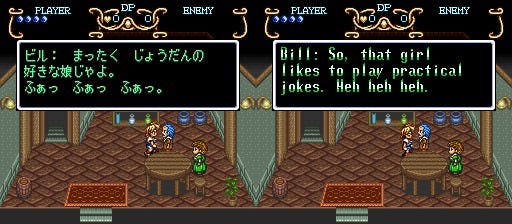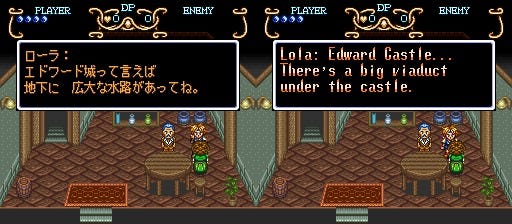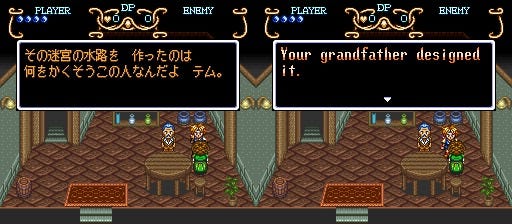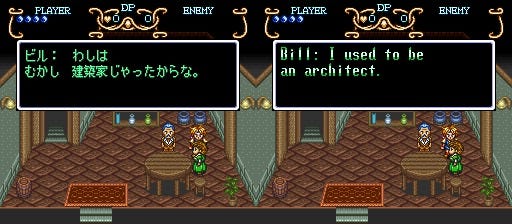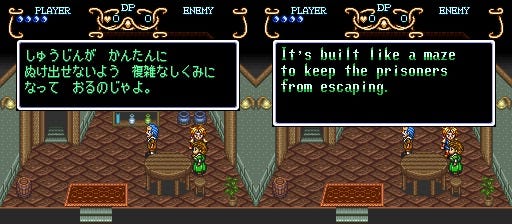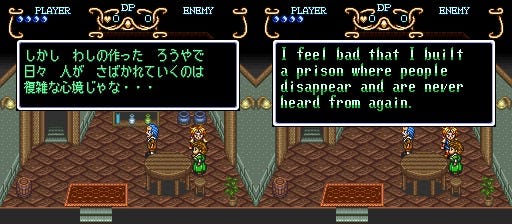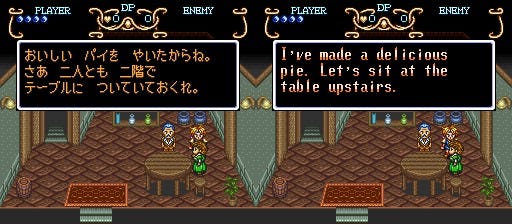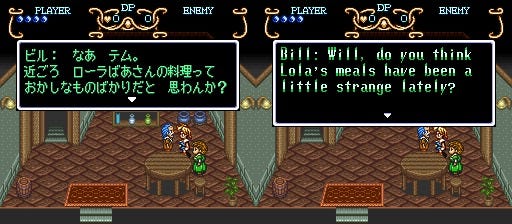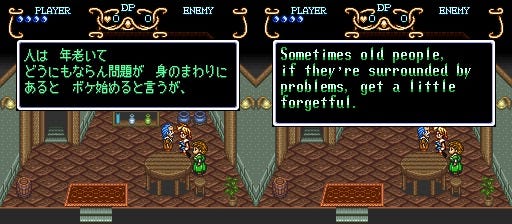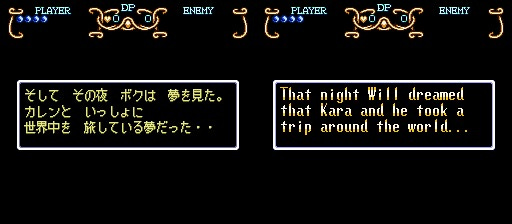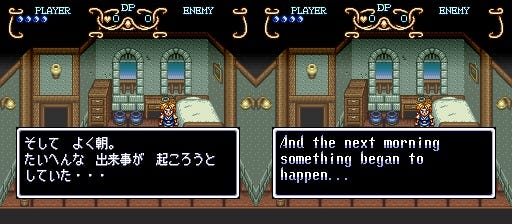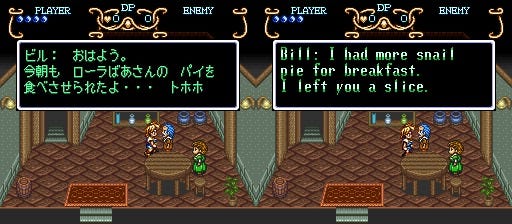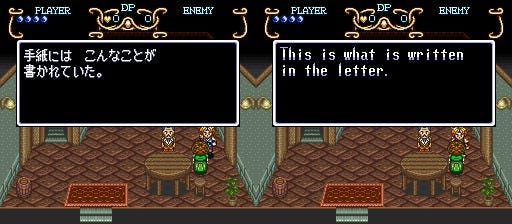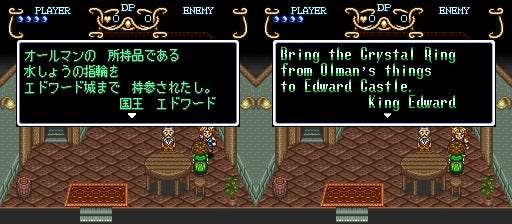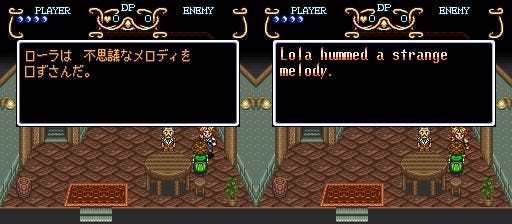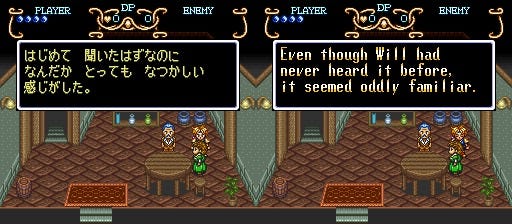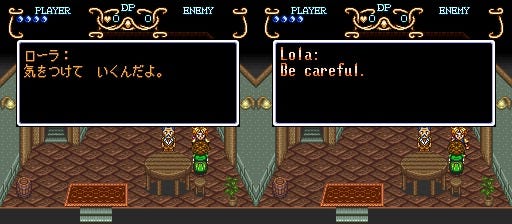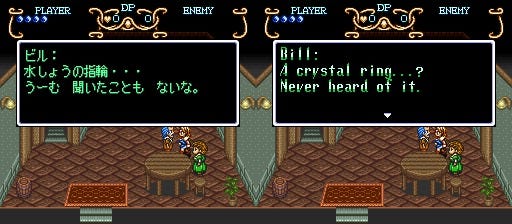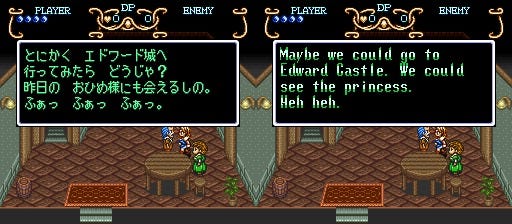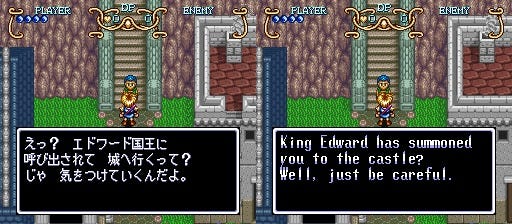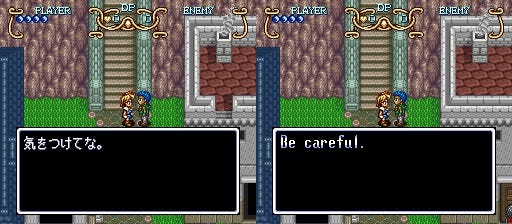Illusion of Gaia Translation Commentary Part 5: Seaside Cave and Meeting Karen
In which the story starts proper, and I do some scolding
Slightly different disclaimer:
I’m an amateur. My advantage over the original translation is that I have no deadline pressure, and I have the modern internet to help me. I’m assuredly wrong about some of my translations.
Translation is hard. When I point out a mistranslation, it’s not a judgment of the original translator(s). (Except in rare instances. Today has one such.)
Some of my translations are rather liberal. I’ll usually make note if so.
Notation reminder:
JP: Original Japanese
T: My translation
OE: Original English
JP: 海岸のどうくつ
T + OE: Seaside Cave
JP: この 海岸のどうくつは ぼくらの 第2の家と言っても おかしくはない。
教会での授業が 終った後は たいてい ここに集まり 日がくれるまで 語り合う。
T: It wouldn’t be wrong to call this seaside cave our second home.
After our lessons at church ended, we usually gathered here to hang out until the sun set.
OE: It was natural for the four friends to call this seaside cave their second home.
Usually, when lessons were done at the school,
they gathered there to talk and play games until sundown.
Another narrator vs. Will problem in the OE. This text is yellow, so it should be in first person.
JP: ロブ:なんだよ テム。 おそかったじゃんかっ。
今 モリスと ブラックジャックの 勝負をしてるんだ。 ちょっと 待ってくれ。
T: Rob: What’s the deal, Tim? You’re pretty late, man.
Right now, Morris and I are in the middle of a game of Blackjack. Wait a little bit.
OE: Lance: What is it, Will? It’s late.
I’m playing cards with Seth. Wait a minute.
Rob speaks the way a teenager thinks a tough adult speaks. He’s kinda rude, but it comes off as childish to me.
JP: モリス: あははっ。 また ぼくの勝ちに決ってますよ。
T: Morris: Ahaha! I’m sure to win again.
OE: Seth: Ah ha ha. I’m going to win again for sure.
JP: とつぜん 血相をかえた エリックが とびこんできた!
T: Suddenly, Erik came flying in with a red face.
OE: Suddenly Erik rushed in with a desperate look on his face.
It uses the phrase 血相をかえた (kessou o kaeta) which could be about facial expression or facial color. I’m guessing color, since Erik has been running.
JP: エリック: はぁ はぁ... ニュースっ! 大ニュースだあっ!
エドワード城の 王女が 行方不明に なったんだってっ! なんでも この町へきたらしいよ!
T: Erik: *huff* *huff*
News! There’s big news!
The princess of Edward Castle has gone missing! They say she came to this town!
OE: Erik: Ah! News! Big news!
The Princess of Edward Castle has run away!
They say she came to South Cape!
JP: ロブ:なんだよ。 そんなに あわてて 飛びこんで くるから もっと すごいことが 起こったのかと 思ったぜ。
それに 王女って あの わがまま娘の カレンだろ。 あんなヤツの どこがいいんだっ?
T: Rob: Dude, so what? The way you came flying in like that, I thought something much cooler had happened.
I bet it’s just that selfish girl Karen. Who cares about her?
OE: Lance: That’s all?
You came in such a hurry that I thought something really big had happened!
The princess is probably that spoiled girl, Kara. The one you like so much!
Rob doesn’t say anything about Erik liking Karen. He says “where’s good about that kind of person?” In JP, where is good about means what’s good about or what do you like about. Based on his derogatory tone, I’d see it as a rhetorical question to which the answer is nothing is good about her.
Karen became Kara in English. Hey, you know how everyone decided that the word bitch is sexist and we shouldn’t use it? Then people just started calling women Karen to mean bitch? So they’re being exactly as sexist and doing something mean to all people named Karen?
Yeah, I’m not ok with that whole trend. No jokes about Karen being a Karen, k? I think that’ll go in the disclaimers here out.
JP: エリック: そりゃそうだけど 王女をさがすために この町へ 兵士たちが やってくるよ。
エドワード城の 兵士って かっこいいじゃない? ぼくは それが 見たいだけだい。
T: Erik: That’s true, but soldiers will come around here looking for the princess.
Edward Castle soldiers look so cool, don’t they? I really want to see them.
OE: Erik: LIAR! Maybe the soldiers will come here looking for her!
The soldiers from Edward Castle look so cool. I want a steel helmet, too.
Dunno where LIAR! came from. そりゃそうだ (soryasouda) means that’s true or obviously.
If you try to leave:
JP: ロブ: 何だよ。 テム。 もう かえっちまうのか?
どうせ 夕食の時間は まだまだ なんだから もう少し 遊んでこうぜ。
T: Rob: What the heck, Tim? You want to go home already?
Dinner time is a ways off, so let’s stick around and have fun a little longer.
OE: Lance: What, Will? Going home already?
It’s not dinner time yet. Let’s play a little while longer.
JP: モリス: ぼくは 女性には きょうみありませんね。 本を読んでた方が 楽しいですよ。
T: Morris: I’m not really interested in girls. Reading books is more fun.
OE: Seth: I’m not interested in girls. I like adventures better.
JP: エリック: ちぇっ。 みんなびっくりするかと 思ったのに...
T: Erik: Dang. I thought everyone was gonna be so amazed.
OE: Erik: And I thought everyone would be surprised…
Amazed, surprised, astonished—they all work.
JP: ロブ: テムも、 そんなところに いないで エリックの となりの席に行けよ。
T: Rob: Don’t just stand there, Tim. Go sit next to Erik.
OE: Lance: Will, get over here and sit next to Erik.
JP: モリス: さて みんな そろったし 今日は 何をしましょうか?
T: Morris: Now that we’re all here, what should we do today?
OE: Seth: Everyone’s here. What should we do today?
JP: エリック: ぼくは テムの ふしぎな力が 見たいなあ。
ほら いつか 見せてくれた じゃない? 手をつかわないで 物を うごかすやつ。
T: Erik: Hey, I wanna see Tim’s mysterious power.
Come on, didn’t you show us the other day? You can move things without using your hands.
OE: Erik: I want to see Will’s mysterious power.
You haven’t seen it? He can move things without touching them.
JP: ロブ: たしか このどうくつの すみっこにある 石像を 動かしたんだよな。
テム。 もう一回見せてくれよっ。
T: Rob: If I’m not mistaken, he moved the stone statue in the corner of the cave.
Tim. Show us one more time.
OE: Lance: He moved the statue that’s in the corner of the cave.
Will. Show me again.
JP: エリック: こないだは はなれたところから 石像を 動かしたんだよね。
T: Erik: You moved the stone statue the other day without going near it, right?
OE: Erik: Last time you moved the statue a long way.
A minor mistranslation. He didn’t move the statue a long way, he moved the statue from a place a long way away.
JP: ロブ: たしか 笛を バトンみたいに まわして ひきよせるんだよな。
T: Rob: You spin your flute like a baton to draw it toward you, right?
OE: Lance: Draw it to you by spinning the Flute around like a baton.
JP: モリス: 石像の方をむいて LRボタンを おすんですよね。
T: Morris: Face the stone statue and press the L or R button.
OE: Seth: Face the statue and push the L/R Buttons.
JP: ロブ: ああっ! うごいたああああっ!!
T: Rob: Aah! It moooooved!
OE: Lance: Oh! It moved!!
JP: モリス: 何回見ても すごいですねっ。
しかし 机とかは 動かないのに なんで その石像だけは 動くんでしょう...
T: Morris: It’s amazing no matter how many times I see it.
But I wonder why you can only move things like that statue, and not something like a desk.
OE: Seth: No matter how many times I see it, I’m still amazed.
But why can you move the statue when you can’t move anything else…?
JP: エリック: いいなあ。 ぼくも そんな力が 使えたらなあ...
T: Erik: So cool. I wish I had powers like that too.
OE: Erik: If I could only do that…
JP: ロブ: よし。 今度は トランプ当てを やってもらおうぜ。
オレが 4枚のカードを 裏返しに おくから ダイヤのエースだと 思うものを 拾いあげてくれ。
T: Rob: Ok. This time let’s play a game with cards.
I’ll put 4 cards on the ground face down. Pick out the one you think is the Ace of Diamonds.
OE: Lance: Next. Pick a card, any card.
I’ll put four cards face down. Pick the one you think is the Ace of Diamonds.
JP: ロブ: さあ。 ダイヤのエースだと 思うものを 拾ってくれ。
T: Rob: Go on. Choose the one you think is the Ace of Diamonds.
OE: Lance: Pick the one you think is the Ace of Diamonds.
JP: テムは カードを 拾いあげた。
それは まぎれもなく ダイヤのエースだった!!
T: Tim chose a card.
Without a shadow of doubt, it was the Ace of Diamonds!
OE: Will picks up a card.
It is the Ace of Diamonds, of course!
This line bugged me as a kid. OE says of course as if this is the expected result, but then everyone acts surprised. The word まぎれもなく (magiremonaku) means unmistakably, not as expected. A small gripe, of course.
JP: ロブ: ああっ。 あたったあっ!!
T: Rob: Ahh. Right on the money!
OE: Lance: Ahhh! Right!!
JP: エリック: ふう。 言葉も出ないよ...
ねえ。 モリス。 こういうのを チョウノウリョクって 言うんでしょ?
T: Erik: Wow. I’m speechless.
Hey, Morris. This kind of thing is called extrasensory perception, right?
OE: Erik: I’m speechless…
Hey, Seth. This is some type of psychic power, right?
Erik is speechless. Dude, it was a one in four chance. Not nearly as impressive as the statue thing.
チョウノウリョク (chounoryoku) literally means superpowers, but it means ESP, not comic book powers. I only mention this due to what’s next.
JP: モリス: チョウノウリョクって いうのはですね、
言葉のとおり 人間の能力を 超えた力...
T: Morris: The meaning of extrasensory perception is…
just as the word says: the ability to perceive things beyond normal human sense.
OE: Seth: Yeah, it must be some kind of psychic power thing.
If I didn’t know better, I’d think it was magic.
The JP says just as the word says, power beyond human ability. But since we didn’t use the word superpower, we can’t translate this the same way. I modified it to be about ESP. The OE doesn’t bother with any of it and comes up with original dialogue.
JP: 人間の感覚っていうのは 見て感じること、
聞いて感じること、
味わって感じること、
においをかいで感じること、
さわって感じること、 の5つだって 言われています。
チョウノウリョクっていうのは 6番目の力 なんじゃないかと ぼくは 思っているんですけどね。
T: We usually identify the human senses as:
sense of sight,
sense of hearing,
sense of taste,
sense of smell,
and sense of touch. These are the traditional 5.
I think that extrasensory perception is the 6th sense.
OE: Most people have five sense…
sight,
hearing,
taste,
smell,
and touch.
I think Will’s psychic power is some kind of sixth sense.
Interesting to see that the false idea that humans have 5 senses exists in Japan as well. We have something from 9 to 30+, depending on what you count. Almost all of these separate senses traditionally get rolled into touch even though they’re not. (For example, sense of temperature, proprioception, nociception, and the sense that your bladder is full—none of these are really touch.)
JP: ロブ: 学者モリスの言うことは むずかしくて オレには よく わかんねーや。
T: Rob: I don’t understand the stuff Professor Morris is saying very well.
OE: Lance: What Seth says is too complicated for me to understand.
JP: ロブ: モリス。 カード出したついでに もう ひと勝負しようぜ。
T: Rob: Morris. While we’re at it, get out the cards and let’s have another match.
OE: Lance: Seth. Let’s play one more game.
JP: ロブ: おれは モリスと もうひと勝負 したら 帰ることにするよ。
T: I’ll go home after Morris and I play another round.
OE: Lance: One more game with Seth and I’m going home.
The other two boys repeat previous dialogue. Time to finally go outside.
JP: 海岸のどうくつを出ると あたりは すっかり 夕やみに 染まっていた。
T: Upon leaving the cave, dusk had completely painted the area.
OE: It was already dark by the time Will left the cave.
Again, this is yellow text so it shouldn’t be 3rd person. And again, not a big deal here, but we’ll run into worse.
JP: ブタが 部屋の中をあらしているっ!
しかし なんで ぼくの家に ブタが...
T: A pig is wrecking the room!
But why is there a pig in my house?
OE: The pig’s wrecking the room!
But why is there a pig in my house?
JP: ブヒ ブヒッ
T + OE: Oink oink
JP: カレン: あらあら ペギーちゃん。 知らない人を いじめちゃダメよ。
あなた、 ここの家の子?
T: Karen: Piggywiggy, you mustn’t treat strangers so roughly!
Are you the child who lives here?
OE: Kara: Hamlet! You shouldn’t snort at strangers!
Is this your house?
In JP, Hamlet is simply named piggy-chan. (Well, technically peggy-chan. Remember you can’t sound the i as in pig in Japanese.)
JP: テム: むっ... そうだけど?
T: Tim: Uh-huh. So what?
OE: Will: Yeah… so?
JP: カレン: なんだか さえない身なりね。
T: Karen: Your clothes are a little unappealing, aren’t they?
OE: Kara: Frankly, you look a little shabby….
Karen is rude here, but I don’t think she’s being frank. I think the idea is that she’s sheltered and surprised by commoner’s clothes. Later her father will say almost the exact same thing, though without softening it with なんだか (nandaka - a little/somehow/somewhat).
JP: テム: わるかったな!
T: Tim: Well, excuse me!
OE: Will: Well, excuse me…!!
Must resist urge to translate it as well excuuuuuuse me, princess! It’s good practice to excise ellipses when translating JP text. Here the translators added one for no benefit.
JP: カレン: お父さまは? お母さまは? いないのね。
T: Karen: And your father? Your mother? Are they not around?
OE: Kara: Your father? Mother? Not here, huh?
Despite being a little rude earlier, Karen has really respectful speech. She refers to Tim’s mother and father as お父さま (otousama) and お母さま (okaasama). お (o) is a respectful prefix, and さま (sama) is one of the most deferential honorifics. Later on this will contrast with Lily’s speech.
JP: カレン: この絵が ご両親?
T + OE: Karen/Kara: Is this a picture of your parents?
JP: テム: そうだよ。 父さんは 探検に 行って...
T: Tim: That’s right. My father went on an expedition and…
OE: Will: My father’s an explorer, he…..
JP: カレン: 知ってるわよ。 オールマン探検隊でしょ、 そうなんしたのよね。
T: Karen: I know. It was the Olman expedition party, and there was an accident, right?
OE: Kara: I know. Olman, the explorer. They say he was lost.
JP: テム: いつか きっと 帰ってくるさ。
T: Tim: He’ll come home some day. I know it.
OE: Will: He’ll come back some day.
JP: カレン: おこったの? ...ちがうわね。
悲しませたのね、 あたしったら.. ごめんなさい...
T: Karen: Are you angry? No, that’s not it.
If I made you sad, I apologize.
OE: Kara: Are you sad? …No?
I’d be sad, if it were me. I’m sorry…
JP: カレン: ところで この家 ピアノも ないのね。
T: Karen: Anyway, do you have a piano in this house?
OE: Kara: Anyway, is there a piano here?
JP: テム: ないよっ、 そんなもの! でも、 ローラおばあちゃんは ものすごく歌が うまいんだぞ。
T: Tim: No, I’m afraid not. But grandma Laura can sing wonderfully.
OE: Will: No, there isn’t! But Grandma Lola is a great singer.
JP: カレン: 歌なら 今 2階で歌ってるわよ。 二人とも声が大きいのなんの。
T: Karen: They’re singing upstairs right now. They both have really loud voices!
OE: Kara: They’re singing upstairs now. They have such loud voices!!
JP: ローラ: おかえり テム。 あたしったら オペラを歌ってたら 時の立つのもわすれて... 夕ごはん できてないのよ。
T: Laura: Welcome home, Tim. Silly me. When I sing opera, I lose track of time. Dinner isn’t ready yet.
OE: Lola: Welcome home, Will. When I sing opera, I lose track of the time…
Dinner’s not ready yet.
JP: ビル: いやはや。 久びさに 大声で歌ったわい。
ローラばあさんは むかし 酒場の 歌ひめを やっとったんじゃ。
わしは ばあさんの 美しい声と心に ほれて プロポーズ したんじゃよ。 ふぁっ ふぁっ ふぁっ。
T: Bill: Good gracious. It’s been a while since I sang so loudly.
Long ago, your grandma Laura was a songstress in a bar, you know.
I fell in love with her beautiful voice and heart, and proposed to her. Hahaha!
OE: Bill: Oh, my! I haven’t sung like this in a long time.
Your grandmother Lola used to be a singer.
I fell in love with her voice. That’s why I married her.
Bill’s speech is a little less romantic in the OE. He married her because of her voice? That’s it? Nothing about her personality? Of course, the mention of a bar is censored.
JP: ローラ: おーほっほほほーっ。 いやだねえ おまえさん! 今ごろ そんなことを もちだして。
そうだ! テム。 聞いて おどろいちゃいけないよ。
さっきまで ここで いっしょに 歌っていた 女の子はね...
T: Laura: Ohhohohohoo! Knock it off, you. Bringing up such a thing at this time.
Really! Tim. Listen, don’t be surprised.
About that girl who was singing with us a moment ago…
OE: Lola: Ah ha ha. Oh, you!! Bringing up a thing like that!
Will, you shouldn’t be surprised to hear that.
The girl who was singing with me a minute ago…
JP: いやーーーーーーーーーっ!!!
一階から 悲鳴が ひびきわたった!
T: Eyaaaaaaaah!
A shriek resounded from the first floor.
OE: No-o-o-o-o!!!
A scream from downstairs!
JP: ビル: さっきの子の 悲鳴じゃっ!!
T: Bill: That girl screamed just now!
OE: Bill: It’s that girl screaming!!
JP: 兵士: おひめさま。 さがしましたよっ!
カレン: おんた達なんか 知らないわよっ。 出てってよっ!
兵士: 何を おっしゃいます。 ここで 連れて 帰らなかったら 私の 首がとびますっ。
T: Soldier: Your highness. We were looking for you!
Karen: I don’t know who any of you people are. Get out of here!
Soldier: What are you saying? If we don’t take you home from here, I’ll lose my head.
OE: Soldier: Princess! I’ve been looking for you!
Kara: I don’t know you. Be gone!
Soldier: What are you saying? If I don’t take you home, I’ll lose my head?
Uh, it’s not a question. I don’t like the OE’s use of be gone. It evokes an image of royalty dismissing an inferior. It sounds haughty. But she’s still pretending she isn’t the princess, and the JP isn’t haughty. It’s a small detail, but it works in bad combination with what’s coming.
JP: カレン: 人ちがいでしょっ。 あたしは 花売り娘のボボンゴって いうのよ。
兵士: おひめさま! そんな 真っ赤なウソに だまされると 思ってるんですかっ。
これは 国王の ご命令なのです。 力づくでも 連れて帰りますよ!
T: Karen: I think you have the wrong person. You see, I’m a flower girl called Bobongo.
Soldier: Your highness! Do you think I can be fooled with such a bold lie?
This is a direct order from the king. We will take you home, even if by force.
OE: Kara: What do I care if you lose your head?
Soldier: Princess!
Do you think I have nothing better to do than chase you down?
I must take you home. It’s the King’s orders!
On previous posts I’ve left a disclaimer that, when I point out mistranslations, I’m not judging the translators. Here I’m going to make an exception.
This? This shit right here? You do not do this.
Here’s how it works in Japanese. Karen’s text is usually pink. When she tells this lie, her text changes to dark red. The soldier then says that he can’t be fooled by such a bright red lie.
We don’t have the expression bright red lie in English, so the joke doesn’t work. But we do have the expression bold lie, and text can also be bold. So you can make almost the exact same joke. Pretty serendipitous! Though you would have to program in a bold font.
Presumably the translators couldn’t do that. So what do they choose to do instead? Change Karen into a callous, evil jerk. What do I care if you lose your head? What the f!?
This is awful. The OE’s characterization of Kara doesn’t match Japanese at all. Her character is sheltered but kind princess. And growing up, I thought she was an awful brat. Translating all this JP text, I wondered… why did I get it all wrong?
And the answer is this line. This one line is so bad, it justifies an entire romhack just to change it. It taints absolutely everything she says after this.
Just think: Later on in the game she gets mad at Tim for hitting innocent fish. How does that action fit with the characterization here, in which she’s as callous as a killer? It doesn’t.
I’ll try to point out later some of Karen’s sweetness that got lost in translation. Really, she’s a good character. I kind of love her.
What’s funny is that I had it backwards as a kid. I thought Kara was an arrogant brat, and Lily was the cool one. As we’ll see later on, Karen is the sweetheart and Lily is a bully.
Even if you don’t agree with my later analysis of Lily, there’s no doubt that the OE massively messed up Karen’s character, and it has its root in this line right here. I can’t say enough bad things about this translation decision. Ok, moving on.
JP: カレン: ウソついて ごめんね。 あたしは エドワード城の カレン。
テムって 言ったかしら? あなたとは 初めて会うっていう 気がしないのよね。 なんだか いいお友達になれそう。
T: Karen: I’m sorry I lied to you. I’m Karen, the princess of Edward Castle.
You said your name was Tim? I feel like this isn’t the first time we’ve met. It somehow seems like we’ll be good friends.
OE: Kara: I’m sorry I lied to you. I’m King Edward’s daughter, Kara.
Will. I feel as though we’ve met before, as if we were good friends.
Imagine how we felt as kids, with this monster saying that she feels as if we’re good friends. Ugh, sorry, I’m doing it again.
JP: ビル: まったく じょうだんの 好きな娘じゃよ。 ふぁっ ふぁっ ふぁっ。
T: Bill: There goes a real prankster. Hahaha!
OE: Bill: So, that girl likes to play practical jokes. Heh heh heh.
JP: ローラ: エドワード城って言えば 地下に 広大な水路があってね。
その迷宮の水路を 作ったのは 何をかくそうこの人なんだよ テム。
テム: ええっ! ほんとに?
T: Laura: Ohhohohoho! Speaking of Edward Castle, it has a huge underground waterway.
And let me tell you something: The person who designed that labyrinth? It was your grandfather, here.
Tim: Huh? Really?
OE: Lola: Edward Castle… There’s a big viaduct under the castle.
Your grandfather designed it.
Will: What! Really?
A minor error in word choice in OE. They meant aqueduct, not viaduct. A viaduct is a type of bridge that’s made of a series of arches or columns.
JP: ビル: わしは むかし 建築家しゃったからな。
あの城の 地下には ろうやがあってな。
T: Bill: Long ago I used to be an architect.
There’s a prison built under the castle.
OE: Bill: I used to be an architect.
There’s a prison under the castle.
JP: しゅうじんが かんたんに ぬけ出せないよう 複雑なしくみに なって おるのじゃよ。
しかし わしの作った ろうやで 日々 人が さばかれていくのは 複雑な心境じゃな...
T: It was designed as a complex maze, so that prisoners couldn’t escape easily.
But every day, I feel guilty that people are being sent to the jail that I made.
OE: It’s built like a maze to keep the prisoners from escaping.
I feel bad that I built a prison where people disappear and are never heard from again.
Bill actually says that he has mixed feelings about it. I think the idea is that he’s proud of his work but sad about how it’s used.
JP: ローラ: さて。 かた苦しい話はやめて そろそろ 夕ごはんにしましょ。
おいしい パイを やいたからね。 さあ 二人とも 二階で テーブルに ついていておくれ。
T: Laura: Ok, enough with the depressing talk. Dinner’s about ready. Let’s eat.
I baked a delicious pie. Come along, both of you, to the table upstairs.
OE: Lola: Enough serious talk. Let’s eat dinner.
I’ve made a delicious pie. Let’s sit at the table upstairs.
JP: ビル: なあ テム。 近ごろ ローラばあさんの料理って おかしなものばかりだと 思わんか?
夕べは ミソごはん。 その前は サシミのカレーあえじゃ。 食べるほうは たまらんわい...
T: Bill: Hey, Tim. Don’t you think Laura’s meals have been kind of odd lately?
Last night, miso rice? And the night before that, sashimi curry. This stuff is unbearable.
OE: Bill: Will, do you think Lola’s meals have been a little strange lately?
Last night, licorice and rice. Before that, mouse fritters. I can’t stand it anymore!
OE does a great job here. You can’t keep miso rice and sashimi curry because western audiences won’t get it. You have to translate to bizarre meals that westerners might understand.
JP: 人は 年老いて どうにもならん問題が 身のまわりに あると ボケ始めると言うが、
ばあさんは 何か わしらに言えない なやみを かかえとるんじゃ なかろうか...
T: People say that when you get old and there are problems you can’t fix, you lose focus.
Maybe she’s anxious about something she can’t tell us about?
OE: Sometimes old people, if they’re surrounded by problems, get a little forgetful.
Maybe there’s something bothering her that she can’t talk about…
Later we find out that Laura has premonitions because of her magic powers from being a native of Itory Village. I guess the idea is that these premonitions are distracting her?
JP: テム: 結局 夕ごはんは ホイップクリームの たっぷりのった ミートパイだった...
ボクは 一切れしか食べなかったけど ビルおじいちゃんは がんばって 三切れも 食べていた。
T: Tim: In the end, dinner was a meat pie that was absolutely loaded with whipped cream.
I could only eat a small piece, but grandpa Bill powered through and ate three slices.
OE: Will: We sat down to a feast of snail pie… with whipped cream!
I only got one piece, but Grandpa Bill ate half the pie.
While the OE did a great job making Lola’s meals sound disgusting, it didn’t do so well in keeping up the idea that Bill and Will hate them. In OE Will sounds delighted to have this disgusting pie—he calls it a feast. And it sounds like Bill ate half the pie because he liked it, but JP says がんばって (ganbatte) which means to persevere, do one’s best, hang on, etc. He persevered and ate more, even though it was awful.
JP: そして その夜 ボクは 夢を見た カレンと いっしょに 世界中を 旅している夢だった..
T: That night, I had a dream. In it, Karen and I were traveling around the world together.
OE: That night Will dreamed that Kara and he took a trip around the world…
I’ve noted when the OE misunderstands when Will is speaking vs the narrator. Often, without text color, it’s not clear. But here it seems deliberate since the text actually includes the personal pronoun ボク (boku - a boyish way to say I).
JP: そして よく朝。 たいへんな 出来事が 起ころうと していた...
T: The next morning, something terrible was in the making.
OE: And the next morning something began to happen…
JP: ビル: おはよう。 今朝も ローラばあさんの パイを 食べさせられたよ...トホホ
T: Bill: Good morning. I had to eat more of grandma Laura’s pie this morning. Boohoohoo!
OE: Bill: I had more snail pie for breakfast. I left you a slice.
Again, the whole idea that Laura’s cooking is awful was dropped.
JP: ローラ: おはよう テム。 お前に エドワード国王から 手紙が 届いているよ。
T: Laura: Good morning, Tim. A letter from King Edward came for you.
OE: Lola: Good morning, Will. A letter has come for you from King Edward.
JP: 手紙には こんなことが 書かれていた。
オールマンの 所持品である 水しょうの指輪を エドワード城まで 持参されたし。 国王 エドワード
T: This is what the letter said.
Bring the crystal ring that was found in Allman’s belongings to Edward Castle. King Edward
OE: This is what is written in the letter.
Bring the Crystal Ring from Olman’s things to Edward Castle. King Edward
I’ve been going with the game’s original translation of オールマン (ooruman) as Olman but I wonder if it shouldn’t be Allman? Maybe a reference to Paul Allman Siple, the Antarctic explorer? I think I’ll go with that from here out.
JP: ローラ: この手紙を 見たときから なんだか 悪い虫が さわぐんだよ。
T: Laura: I’ve had a temper stirring ever since I saw this letter.
OE: Lola: I’ve been in a bad mood ever since I saw this letter.
JP: そうだ。 テム。 おまじないを 一つ 教えておくわ。 困ったときに このメロディーを ふけば きっと のりきれるからね。
ローラは 不思議なメロディーを 口ずさんだ。
T: Oh yeah, Tim! I’ve got something for luck. Whenever you’re in a bind, if you play this melody, I’m sure you’ll make it through.
Laura hummed a mysterious melody.
OE: Oh, Will. I’ll teach you a spell. When I’m upset, humming this tune makes me feel better.
Lola hummed a strange melody.
If you’re wondering how OE got the word spell, it’s probably from おまじない (omajinai) which means good luck charm. I translated it differently because to me that implies a trinket, rather than an action or a song. The word charm can mean a spell (as in placed a charm on), but I don’t think it’s appropriate to call the song a spell.
JP: それは すてきな メロディだった。
はじめて 聞いたはずなのに なんだか とっても なつかしい 感じがした。
T: That melody was wonderful.
Even though this was the first time I heard it, for some reason it gave me a deep longing.
OE: That’s pretty.
Even though Will had never heard it before, it seemed oddly familiar.
JP: ローラの メロディをおぼえた!
T: Learned Laura’s melody!
OE: You’ve learned Lola’s melody!
JP: ローラ: 気を付けて いくんだよ。
T + OE: Laura/Lola: Be careful.
JP: ビル: 水しょうの指輪... うーむ 聞いたことも ないな。
お前の父 オールマンの 残した 荷物にも そんなものは なかったし...
T: Bill: A crystal ring? Hmm. I haven’t heard of it either.
There wasn’t anything like that in the baggage your father Allman left behind.
OE: Bill: A crystal ring…? Never heard of it.
There was nothing like that in the luggage your father, Olman, left behind.
JP: とにかく エドワード城へ 行ってみたら どうじゃ? 昨日の おひめ様にも会えるしの。 ふぁっ ふぁっ ふぁっ。
T: At any rate, why not go to Edward Castle? You may be able to meet the princess from yesterday again as well. Hahaha!
OE: Maybe we could go to Edward Castle. We could see the princess. Heh heh.
As is so often the case, JP leaves out pronouns and you have to infer which ones to use. Bill is not saying that he wants to go to the castle and see the princess. He’s hoping for Tim to see her.
You can talk around town, but to my knowledge there’s only one new line of dialogue. It’s from Rob/Lance:
JP: ロブ: 今日は 教会の勉強も 休みだし.. 何か 面白いことねえかなあ。
T: Rob: We get a break from church lessons today. I wonder if there’s anything interesting to do.
OE: Lance: It’s a day off from school. Let’s have some fun.
Finally, when we leave, the guard gives us the last lines of dialogue from South Cape (for now).
JP: えっ? エドワード国王に 呼び出されて 城へ行くって? じゃ 気を付けていくんだよ。
T: Eh? The king wants you to hurry to the castle? Then be careful on your way.
OE: King Edward has summoned you to the castle? Well, just be careful.
JP: 気をつけてな。
T + OE: Be careful.
This was a long entry, but it’s a text heavy game and I’ve occasionally got lots to say about it. From here we head out to Edward Castle and the first dungeon of the game. (Thanks a lot, Bill the architect.)




